MTRON SSD 32GB: Wile E. Coyote or Road Runner?
by Gary Key on August 15, 2007 3:00 AM EST- Posted in
- Storage
PCMark05 Performance
We are utilizing the HDD test suite within PCMark05 for further comparative hard disk scores as it provides a mixture of actual application results and specific read/write percentages utilized within these programs. The program utilizes the RankDisk application within the Intel iPEAK SPT suite of tools to record a trace of disk activity during usage of real world applications. These traces are then replayed to generate performance measurements based upon the actual disk operations within each application. The HDD test suite contains 53% read and 47% write operations with each trace section utilizing varied amounts of read or write operations. Additional information about the test suite can be found in PDF format here PCMark05 whitepaper.
Our test results are based upon the following trace runs:
Windows XP Startup: This test consists of 90% reading and 10% writes that tracks XP activities at start-up.
Application Loading: This test consists of 83% reading and 17% writes that tracks the opening and closing of the following programs.
File Write: This test consists of 100% write activities by writing 680MB of files onto the hard disk.
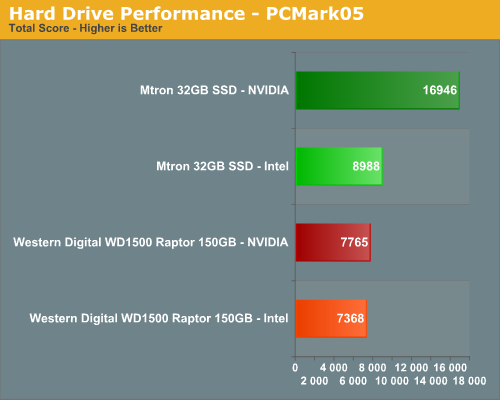
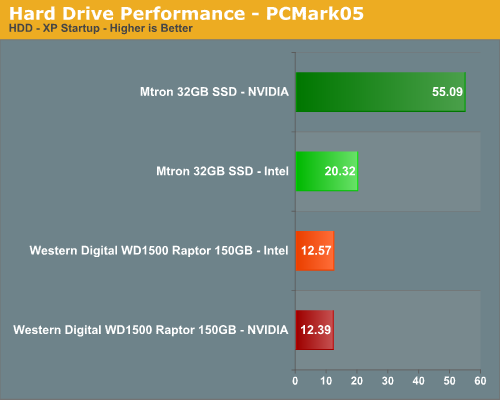
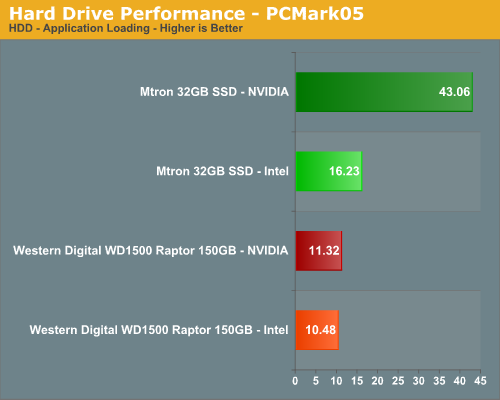
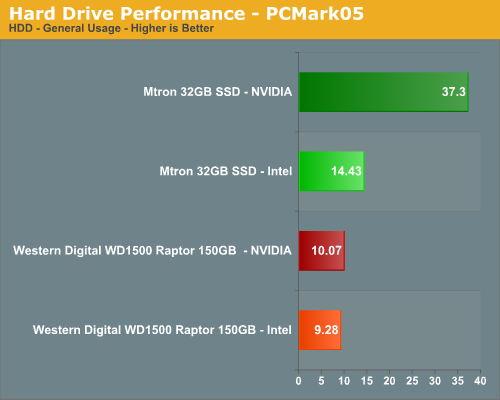
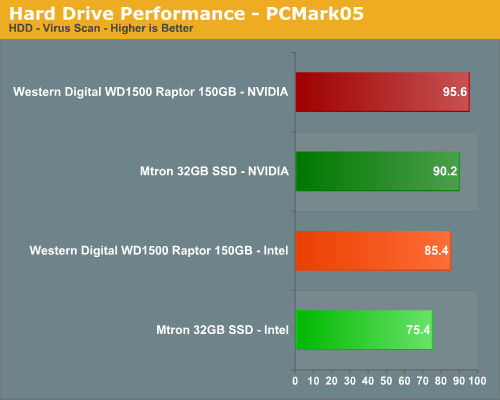
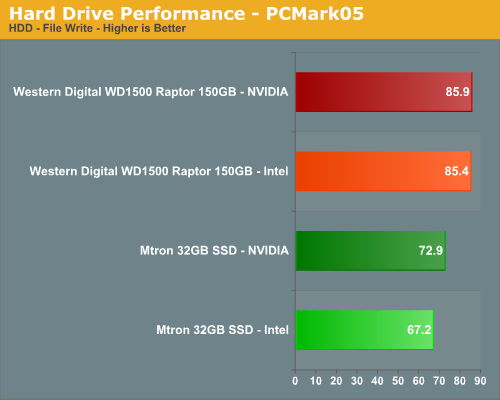
Our PCMark05 results show a new benchmark champion, and of course if you are using an NVIDIA based chipset then the resulting numbers are just that much better. Solid State Drives feature extremely low access times that are usually in the <1ms range and the first three PCMark05 test that emphasize read speeds over write speeds show the MTRON drive just walking all over the Raptor, especially with the NVIDIA chipset. While the numbers are impressive with the NVIDIA chipset, we tend to believe the Intel generated numbers are closer to actual application performance while the NVIDIA numbers are more representative of the hard drive's pure performance capability.
We fully expected the MTRON drive to score higher in the almost read only Virus scan test but it surprised us with a score slightly less than the Raptor, indicating that small block sequential file reads are not optimized on the drive at this time. We noticed the same pattern in our internal iPEAK tests where the drive scored about the same as the Raptor in the AVG virus scan and Winstone video creation tests. There is a 19% difference between the NVIDIA and Intel chipsets with the MTRON drive.
File Write tests tend to show major differences between the SSD and mechanical disks in our tests to date. The lower write speeds of the MTRON disk are in alignment with our expectations based on the drive's 80 MB/sec write speed specification. The results in PCMark05 were reproducible in our revised iPEAK test suite although we are still investigating the wide disparity between the NVIDIA and Intel controllers. However, pure hard drive performance is just one aspect of testing so let's see how the drive fares in a few application test results with both controller chipsets.
We are utilizing the HDD test suite within PCMark05 for further comparative hard disk scores as it provides a mixture of actual application results and specific read/write percentages utilized within these programs. The program utilizes the RankDisk application within the Intel iPEAK SPT suite of tools to record a trace of disk activity during usage of real world applications. These traces are then replayed to generate performance measurements based upon the actual disk operations within each application. The HDD test suite contains 53% read and 47% write operations with each trace section utilizing varied amounts of read or write operations. Additional information about the test suite can be found in PDF format here PCMark05 whitepaper.
Our test results are based upon the following trace runs:
Windows XP Startup: This test consists of 90% reading and 10% writes that tracks XP activities at start-up.
Application Loading: This test consists of 83% reading and 17% writes that tracks the opening and closing of the following programs.
- Microsoft Word
- Adobe Acrobat Reader
- Windows Media Player
- 3Dmark 2001SE
- Leadtek WinFast DVD
- Mozilla Internet Browser
- Opening a Microsoft Word document, performing grammar check, saving and closing.
- Compression and decompression using WinZip
- Encrypting and decrypting a file using PowerCrypt
- Scanning files for viruses using F-Secure Antivirus
- Playing an MP3 file with Winamp
- Playing a WAV file with Winamp
- Playing a DivX video using DivX codec and Windows Media Player
- Playing a WMV video file using Windows Media Player
- Viewing pictures using Windows Picture Viewer
- Browsing the Internet using Microsoft Internet Explorer
- Loading, playing and exiting a game with Tom Clancy's Ghost Recon
File Write: This test consists of 100% write activities by writing 680MB of files onto the hard disk.






Our PCMark05 results show a new benchmark champion, and of course if you are using an NVIDIA based chipset then the resulting numbers are just that much better. Solid State Drives feature extremely low access times that are usually in the <1ms range and the first three PCMark05 test that emphasize read speeds over write speeds show the MTRON drive just walking all over the Raptor, especially with the NVIDIA chipset. While the numbers are impressive with the NVIDIA chipset, we tend to believe the Intel generated numbers are closer to actual application performance while the NVIDIA numbers are more representative of the hard drive's pure performance capability.
We fully expected the MTRON drive to score higher in the almost read only Virus scan test but it surprised us with a score slightly less than the Raptor, indicating that small block sequential file reads are not optimized on the drive at this time. We noticed the same pattern in our internal iPEAK tests where the drive scored about the same as the Raptor in the AVG virus scan and Winstone video creation tests. There is a 19% difference between the NVIDIA and Intel chipsets with the MTRON drive.
File Write tests tend to show major differences between the SSD and mechanical disks in our tests to date. The lower write speeds of the MTRON disk are in alignment with our expectations based on the drive's 80 MB/sec write speed specification. The results in PCMark05 were reproducible in our revised iPEAK test suite although we are still investigating the wide disparity between the NVIDIA and Intel controllers. However, pure hard drive performance is just one aspect of testing so let's see how the drive fares in a few application test results with both controller chipsets.










37 Comments
View All Comments
enovikoff - Thursday, October 29, 2009 - link
I purchased two 7000 series SSDs for running a commercial datacenter (hey, they're billed as "enterprise") Both failed within 3 months and MTRON did not stand behind them. Instead they said that I should mail them to Korea(!!!) and wait to see if their tests indicated that they were defective. In my business "waiting" means I either have to spend money to replace the hardware or leave my customers high and dry. Attempts to RMA the SSDs through their reseller, NeoStore, also failed: NeoStore took the SSDs back and then never acknowledged emails or calls. $2000 worth of hardware (I have receipts/invoices to prove everything) is in their possession, and my company is out the $2000 as well as the refunds we had to pay our customers for the downtime.Avoid MTRON: they're not ready to provide reliable units or do business in the United States.
WaterGun - Thursday, August 16, 2007 - link
The same drive is for sale in Japan for only 99800 Yen ~ US$900. Here is a list of online shops:http://www.3top.co.jp/shohin_ichiran.php?SearchMod...">3 Top
http://shop.tsukumo.co.jp/goods/4582149901982/2015...">Tsukumo
http://www.ark-pc.co.jp/item/MSD-SATA602532/code/1...
So, why is there such a big price difference? Any takers?
brundlefly - Friday, August 17, 2007 - link
Hmmm there should be some kind of service that helps you order from Japanese web sites.PrinceGaz - Thursday, August 16, 2007 - link
Presumably, the 32GB SSD is measured using binary GB (1,073,741,824 bytes) rather than decimal GB like traditional hard-drives, therefore making it roughly 34.3GB when comparing it to other hard-drives. Still a bit on the small side, but perhaps worth mentioning.brundlefly - Thursday, August 16, 2007 - link
fdisk shows the device as 33.2 GB, but formatted as ext3 df shows ~31GB available.Disk /dev/sda: 33.2 GB, 33285996544 bytes
255 heads, 63 sectors/track, 4046 cylinders
Units = cylinders of 16065 * 512 = 8225280 bytes
df .
Filesystem 1K-blocks Used Available Use% Mounted on
/dev/sda5 31981396 8893912 21462916 30% /mnt/mtron
brundlefly - Thursday, August 16, 2007 - link
I received one of these this week too for evaluating as a MySQL datadir.The results were outstanding - we had a handful of problem queries which would take 30-40 seconds on a 15k Fujitsu MAS Ultra SCSI. The same queries take about 3 seconds on the MTRON.
I have worked with large MySQL databases for years, but there are a lot of examples like this one where I just cant qualify throwing a few days into A/B testing various indexing and table schemas for the performance issues with a handful of slow queries - especially when just *loading* a table and creating an index can take 20-30 min each. Throwing hardware at the problem is far cheaper and you can use simpler table layouts, plus you may not even be able to achieve this performance any other way in some scenarios.
IMHO this is a unique 'drop-in' solution for a lot of specific data center applications. In the long term you are going to see these replace mechanicals across the board in the server room because they will be cheaper and far simpler to deal with then SCSI and offer far better performance with low heat, noise, and power.
I also popped it in my notebook, which was just sublime. I already had the fastest mechanical in this notebook - a brand new Hitachi 7k200 with 16MB cache.
Within 34 min I had a 32-bit Vista Ultimate / Ubuntu Feisty x64 dual-boot setup - Vista booted in 21 seconds, Ubuntu in a little under 30 (a savings of about 6 seconds for each). No noise, vibration, or heat - the fan never came on, even set to high performance power profile. I didnt do a battery life test but from the battery remaining indicator I would expect an extra half hour.
Immediately the advantages of having a .1ms access time became apparent. Stuff just happens. Firefox cold boots in 3s, open a bunch of apps - the disk doesnt care, every piece of data is exactly .1ms away. Write speeds are more traditional but still as good as or better than the Hitachi. Subjectively the mental line between memory and disk usage just kind of dissolves.
While booting, I heard the BIOS check the optical drive, and it was like 'wtf with this prehistoric mechanical thing in my notebook!' In a notebook, the mechanical drive is dead, IMHO, but yet once the prices come down.
The lack of storage space was a downer, especially after just getting used to the 200GB in the Hitachi. I was thinking this could be partially augmented with a cheaper, slower 16GB expresscard SSD for music, etc.
On my overclocked 3Ghz C2D 6400 2GB Raptor desktop, the results were similar but subjectively not as exciting since I dont really care about heat noise vibration power (BF2142 booted to 'join game' in 70s vs 80s on the raptor). I would definitely wait until the prices for a 64GB came down to $300 or so before using one as a boot drive.
I use VMWare workstation a great deal, although I havent tried it yet this would be another application which would benefit greatly since it uses a pseudo-disk.
The disk is definitely going into production immediately on the MySQL server, and I am considering getting one as my primary Linux development workstation disk as 32 GB goes a long way in that application, and I have never seen a Linux desktop perform like that. Plus I do a lot more disk-intensive stuff in development vs web surfing etc on my notebook or desktop PC.
There is no argument IMHO - mechanicals are a dead-end technology as a notebook/desktop/server boot and application disk as soon as the prices come down.
bji - Wednesday, March 14, 2012 - link
You ended up being correct on all counts: 4 and a half years later and SSDs are making major inroads in every place you predicted they would. You can get a 120 GB SSD now for under $200 and it blows away the 32 GB Mtron you tested in every performance category.Googer - Thursday, August 16, 2007 - link
Could you possibly revisit this article at a later date and post some Mtron vs Raptor RAID 0 benchmarks?Also for the enterprise market and serious enthusiast, comparing this SSD to a Seagate 15k.5. Which would be the better value, 15K SAS or SATA SSD?
erikejw - Thursday, August 16, 2007 - link
Please get another one and test it in Raid 0.Verdant - Wednesday, August 15, 2007 - link
I would kill for one of these for my tablet, that would really affect battery life....and all the other good looking benefits. On the other hand i don't see working within the SSD capacity limitations, and i don't see spending nearly as much on an hd as the machine itself. I am hoping next refresh (2-3 years)something like this will meet my needs.